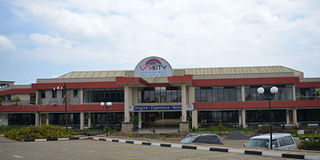Premium
Inside the jinxed Kenyatta University mall hosting China Square

UniCity mall in Kenyatta University along Thika Road. It is one of the shopping malls serving the residents of Ruiru. PHOTO | FILE | NATION MEDIA GROUP
The storm surrounding China Square is the latest misfortune to befall Unicity Mall, which has been searching for an anchor tenant for more than five years since it was completed.
The mall that cost Kenyatta University close to Sh3 billion has largely remained empty, with occupancy below 30 per cent. Its return on investment has not been impressive at a time the university is in debt and needs to generate much-needed revenue for its operations.
However, the new anchor tenant, China Square, was closed Monday for the second day, in reaction to protests from local traders and the Cabinet secretary for Investments, Trade and Industry, Mr Moses Kuria, who accuse the China Square of pricing local traders out of business.
On Saturday, the management said the closure was to re-evaluate and replan its business strategy just one month after the store opened on January 29.
“The owners are inside with the workers reorganising the place. We don’t know when it will be opened but people are, of course, worried about losing jobs,” a security guard at the mall told Daily Nation. “It has been hectic. There has been a lot of traffic and it’s been hectic for us. We have to counter-check receipts against the goods purchased since there are no scanners inside the supermarket,” he added.
There was little activity at the mall on Monday, in sharp contrast to the previous three weeks when shoppers thronged the mall and filled the car park, forcing others to park outside the compound. An eatery at the ground floor that had started enjoying a huge flow of customers only had a few customers on Monday.
Phase 1 of the multibillion shopping complex at KU main campus on Thika Road was commissioned in February 2016. Then-Education, Science and Technology Cabinet Secretary Fred Matiang’i described it as “truly creative, not just in design and construction but also in the originality of the ideas”.
The plan was to establish a modern mall with amenities such as a departmental store, retail shops, banks, food courts, a petrol station run by the National Oil Corporation of Kenya, and a spacious car park. These were done in the first phase. Other phases would comprise the building of conference facilities, a five-star hotel and a recreational park.
“The journey started out of a dream to add to our third revenue stream base in order to cater for the ever increasing need for resources,” the former vice chancellor of Kenyatta University, Prof Olive Mugenda, enthused.
The other two streams are government capitation and fees paid by students.
However, the return on investment for the more than Sh2.6 billion spent on the project has been negligible.
KU has been flagged by the Auditor-General as one of the public universities unable to meet their financial obligations and at risk of insolvency. This is as the billions sunk into the project have lain unprofitable for years.
Uchumi Supermarkets, even in its last kicks, haboured ambitions of being the elusive Unicity anchor tenant. Former CEO John Ciano at the time described the intended Unicity branch as “a hypermarket that would also be used as a training facility for university students to enhance their business skills and knowledge in the retail sector”.
That dream came a cropper with Uchumi’s fortunes going south. Another major local supermarket chain then expressed interest but later backed off, leaving acres of yawning space at the imposing complex. The supermarket chain is also going through financial challenges.
The troubles bedeviling Unicity Mall appear to have started at the concept stage. Even though Prof Mugenda defended the investment, the numbers do not add up.
“From a research that we undertook prior to the construction of the mall, we realised that statistically, Thika Super Highway has an approximate traffic load of 70,000 vehicles daily, which is increasing at a rate of about 1,000 cars every month,” she said during the commissioning.
“The huge human settlement of approximately two million that dwell along the highway, within and around the main campus makes the Unicity a business hub for income generation. Kenyatta University alone, with over 70,000 students and over 5,000 members of staff, offers a ready market for entrepreneurs who will invest at the mall.”
At the time the project started, the Kenya National Bureau of Statistics estimated Nairobi’s total population at 4.2 million people, making it unlikely that almost half of the city population reside along Thika Road.
Unicity is not the only project at Kenyatta University that seems to have run into headwinds. The Kenyatta University Teaching, Referral and Research Hospital, built at a cost of Sh8 billion, is no longer in the university’s control after the national government acquired it and made it a parastatal in January 2019.
Its launch had been delayed over rows between the university and the government over its ownership and also a petition by activist and now Busia Senator Okiya Omtatah, who wanted the university to own the hospital, but he lost the case.





